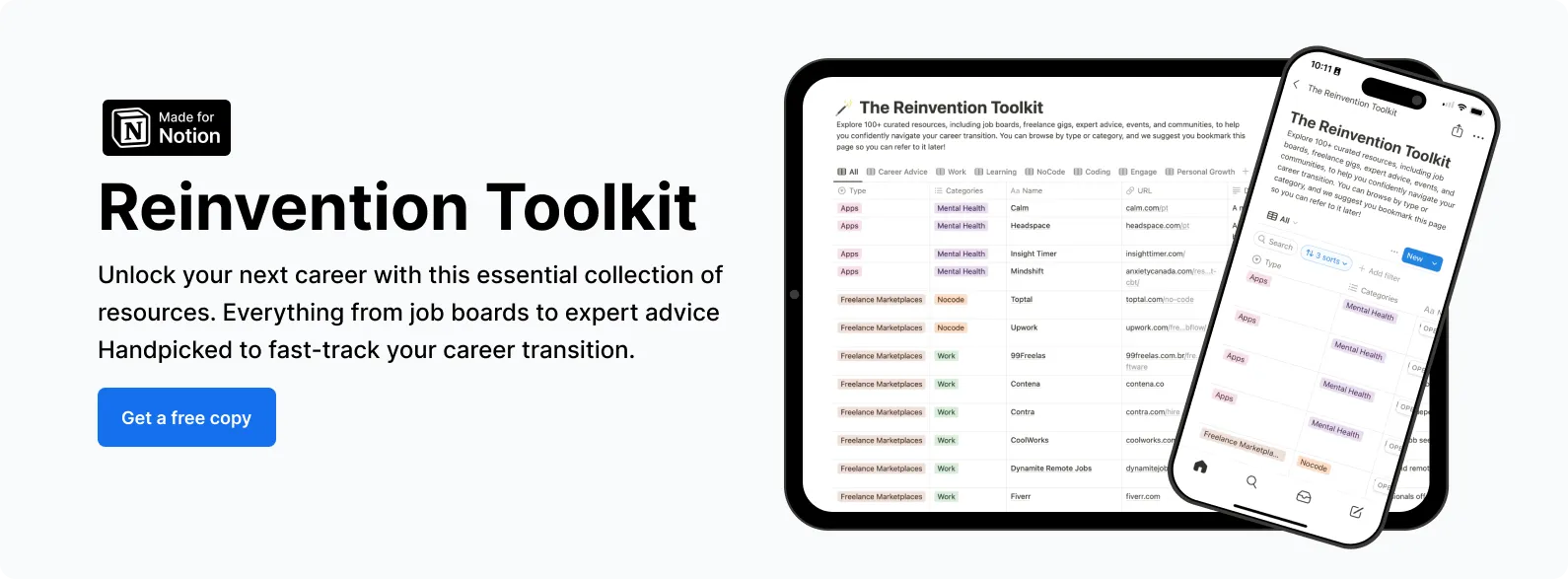Steps to Conduct Thorough Industry Research to Identify Job Opportunities
Learn how to conduct thorough industry research to uncover job opportunities. Follow these steps to gather valuable insights, analyze trends, and identify potential employers.
Table of contents

Learn how to conduct thorough industry research to uncover job opportunities. Follow these steps to gather valuable insights, analyze trends, and identify potential employers.
Starting a job hunt can feel like diving into the unknown, especially if you're looking to switch careers or break into tech.
Whether you're stuck in a monotonous job, facing the threat of automation, or simply dreaming of a stable and fulfilling career, the journey from an uncertain job market to a tech-savvy professional can be daunting. You might be wondering how even to begin.

Imagine transforming from a "feeling stuck and insecure" person to a confident person who is stepping into a role that excites you and pays well.
That's where industry research comes in. By knowing where to look and what to look for, you can turn your job hunt from a stressful ordeal into a strategic adventure.
This guide will show you the steps to conduct thorough industry research, helping you identify job opportunities that align with your goals and dreams. Let's explore how to uncover the right industry insights that will help you land your dream job.
When you're ready to dive into a new career, knowing where to start can be overwhelming. To make the leap, you'll need to gather the right information and insights about your target industry.
Picture yourself confidently navigating this journey, armed with knowledge and a clear plan. Ready to transform your career prospects? Let's get started!
When you're eyeing a new job, finding the right industry is like finding the perfect pair of shoes -it has to fit just right. Identifying your niche isn't just a step - it's a strategic move toward landing a job that excites and fulfills you.

Take Alice, for example. Alice had this dilemma, as she posted on one of the forums, torn between biosecurity research and building an effective altruism community.
"If I chose biosecurity, what, specifically, would I be doing? Would I get a Ph.D.? If so, where? Who would be my advisor?”
These questions helped her get specific about her career path and understand the day-to-day realities of each option.
Chris Humphrey, in one of his posts on JobsOnToast, had a similar journey.
"The first time I did it, going from academia into e-learning, was the hardest, purely because I wasn't familiar with how the private sector worked.”
Chris recalls that his approach was to dive deep into understanding his target sectors by researching companies and the roles they offered.
"Each time I've changed sectors in my working life so far, I've given myself a complete crash course in that sector.”
Both Alice and Chris highlight the importance of getting specific about your career.
Chris advises the value of understanding market trends, key players, and the language used in the industry.
"Start with the websites of organizations in your chosen sector. By definition, organizations use their websites to present and organize information for their customers and users."
Alice, on the other hand, used her questions to zoom in on what her daily work would look like.
"What lines of research would I be pursuing? It doesn't matter whether meta-EA is better than biosecurity research in general; what matters is whether biosecurity research is better than meta-EA for me.”
By honing in on your ideal industry, you not only make your job hunt more focused but also more effective. As Chris mentions....
"The key pieces of information you're trying to find out when 'mapping the landscape' of your target sector are... The main organizations, market trends, and the language and terminology of that sector," can guide you in this process.
Key Takeaways from the Journey of Alice and Chris
So, start narrowing down your options and get ready to dig deep into the specifics! With NoCode Institute’s Foundations Program, you can gain the essential skills needed to excel in your new industry. Explore our No-Code Programs to find the right fit for your career transition or job hunt journey.
Unlock job opportunities with our guide on top personal branding strategies, including building a strong online presence, networking effectively, and showcasing your unique skills and experiences.
Networking can be a game-changer for career changers and job hunters. It alleviates job insecurity fears and informs your decisions, helping you understand a new role's practicalities while building a support system to guide you through your transition.

Miranda Zhang found this out firsthand. She shared her story on an online forum. As a recent graduate, she was struggling to plan her career path.
"Networking calls have been immensely helpful not for clarifying my cause priorities but rather for gaining an understanding of the concrete skills and responsibilities that a role might involve.”
For Miranda, talking to people already working in the field made uncertainty more manageable. This practical experience, combined with insights from networking, helped her understand if a career path was truly the right fit.
"If the role involves a lot of event planning, do you like event planning? If you don't know, then maybe you should identify a way to briefly trial that!”
Chris Humphrey from JobsOnToast shares a similar sentiment. Chris emphasizes the importance of asking about the latest trends, the direction of the sector, and current challenges.
"Through your network of friends and family and your university careers service, get introduced to people who already work in your chosen industry or sector.”
He also recommends online networking. He points out that engaging in these communities can provide a wealth of information and help you come across as a knowledgeable professional.
"The Internet gives you access to all kinds of industry groups and forums, which you can join for free.”
Key Takeaways from the Journey of Miranda and Chris
So, start reaching out and talking to people—it's a vital step towards your dream job. With NoCode Institute’s resources, like the article on daily habits for career transformation and insights on how to get into the tech industry, you can build a strong network and make informed career decisions.
When you're on a job hunt, alumni networks can be your secret weapon. This approach highlights the importance of maintaining strong relationships and leveraging them to gain valuable industry insights.

Melinda Johnson's story is a perfect example. Melinda graduated from Fairleigh Dickinson University and started her career in Human Resources, only to face a layoff in January 2023.
"I got laid off from my role in late January 2023"
Faced with this setback, she reached out to her alumni network. Their support was invaluable, providing her with industry insights, job prospects, and crucial advice.
"I reached out to my connections at FDU: my former professor, Dr. Scott Behson, and Director of Placement and Outreach, Paige Soltano, for guidance."
Through this network, Melinda reconnected with Bob, an alumnus she met at an HR event. Armed with this information about industry insights and interview tips from her alma mater, she successfully landed the job.
"Through my networking efforts, I learned about an HR representative role at Campbell Soup Company that aligned with my skills and experience.”
So, don't hesitate to reach out to your alumni network—they can be instrumental in guiding you to your next career move.
Key Takeaways from the Journey of Melinda
When you're on the job hunt, job boards are essential for finding unexpected opportunities and understanding employer needs. This approach can turn job seekers' fears into confidence and excitement as they discover roles that align with their dreams.

Susan Kaveny’s story illustrates this perfectly. She advises, in a Quora post, not to make job boards an afterthought but also not to rely solely on them.
"I look at the websites of the companies I would like to work for. After that, if I find a job I’m interested in, I tailor my resume for that exact job”
By customizing her resume to match the specific knowledge, skills, and aptitudes (KSAs) listed in job postings, she maximizes her chances of getting noticed. Susan also highlights the value of sites like Indeed and Glassdoor.
"You can see company reviews on those sites. I prefer Indeed a little bit partly because you can search all jobs near you and will find ones that are nearby, that you’re qualified for and that you would never have thought of on your own.”
By checking multiple job boards, Susan discovered unique opportunities, like a local job that paid three times the average wage.
"I once found a job on Indeed that was local and paid roughly three times the average wage in the area. It was counting fish”
Key Takeaways from the Journey of Susan
So, explore various job boards and tailor your applications to make the most of your job search. Check out NoCode Institute's insights on job search sites in Europe and tips on how to get out of customer service. These resources can help you discover new opportunities and refine your job search strategy.

When changing careers, social media is a treasure trove of industry insights. Following experts and engaging with content can turn fears into confident career decisions, helping you stay ahead of trends and find the right fit for your next career destination.

Chris Humphrey’s journey sheds light on this. He found that diving deep into blogs and podcasts gave him a real sense of the industries he was exploring.
"I’ve given myself a complete crash-course in each sector I moved into by reading blogs and listening to podcasts. Blogs are great for getting inside the mindset of your chosen sector, while podcasts keep you updated on the latest issues and trends."
Topher Hallquist, in one of the forum posts, also underscores the value of social media in evaluating job opportunities.
"As I’ve researched various job opportunities, I’ve found there’s a shocking amount of variation on how much two job opportunities can differ.”
He further elaborates...
"For example, maybe Google only offers you slightly more cash than the startup you interviewed with—but the startup is giving you so little equity it won't be worth much even if the company gets acquired for $100 million, whereas Google offers you RSUs worth half again what your base salary is.”
Chris's method involved comprehensive research. This approach not only equipped him with industry-specific knowledge but also helped him spot better job opportunities.
"I downloaded free podcasts and read countless blogs to understand the day-to-day workings and future developments of different sectors.”
Key Takeaways from the Journey of Chris and Topher
So, start leveraging social media to unlock the insights you need for your next career move. Be it career transition move like how to break out of being an administrative assistant or tips on high-paying tech jobs with no experience, NoCode offers cohort programs that will provide you with the insights you need to make your next career move.
When you're job hunting, it's crucial to conduct due dilligence to avoid potential pitfalls. It transforms fears of falling into scams or unstable companies into confident steps towards finding a secure and rewarding career.

One Redditor, shared their meticulous process for vetting companies, highlighting the importance of this step. This initial step helps ensure the company is legitimate and established.
"I look for a company website with a role listing. Then I verify their location, regional office, HQ, etc."
The Redditor continues…
"I look up the company on opencorporates.com to see if they're established or brand new. I also check their registered agent or company manager/president to learn more about their history.”
Another critical step is checking LinkedIn and employee review sites. These platforms can provide insight into the company culture and employee satisfaction.
"Look at their LinkedIn page to find current or past employees. Refer to their Glassdoor or Indeed page for employee reviews if one exists."
Reddit searches can also be informative. This can help confirm any suspicions or uncover issues other job seekers have encountered.
"Do a Reddit search if they're based locally. Sometimes people are flagging them and posting their takes and experiences.”
For your safety, the Redditor suggests avoiding certain actions.
"I would balk at requests to download any apps on to my phone as part of the prospecting phase. Stick to email communication (create a paper trail), stick to Zoom or Google Meet for virtual meetings.”
Key Takeaways from the Redditor’s Journey
So, before you jump into any job offer, make sure to dig deep and spot any red flags. For more tips on navigating your job search, check out NoCode Institute's article on how not to become obsolete in a digital era and explore insights on transforming employability through no-code. These resources can help you make informed career decisions.
Harnessing industry insights is essential for navigating a career change successfully. By identifying your niche, networking, tapping into alumni networks, reviewing job boards, using social media, and conducting due diligence, you can turn fears of the unknown into confident career decisions.
These strategies help you uncover opportunities, avoid pitfalls, and find roles that truly align with your skills and dreams. So, dive deep into your research and take informed steps toward a fulfilling career.
Ready to unlock new job opportunities? Explore our programs at NoCode Institute today and take the first step toward a more rewarding career!
Looking to re-invent yourself and turn your talent into a career? Stay up to date with the latest.